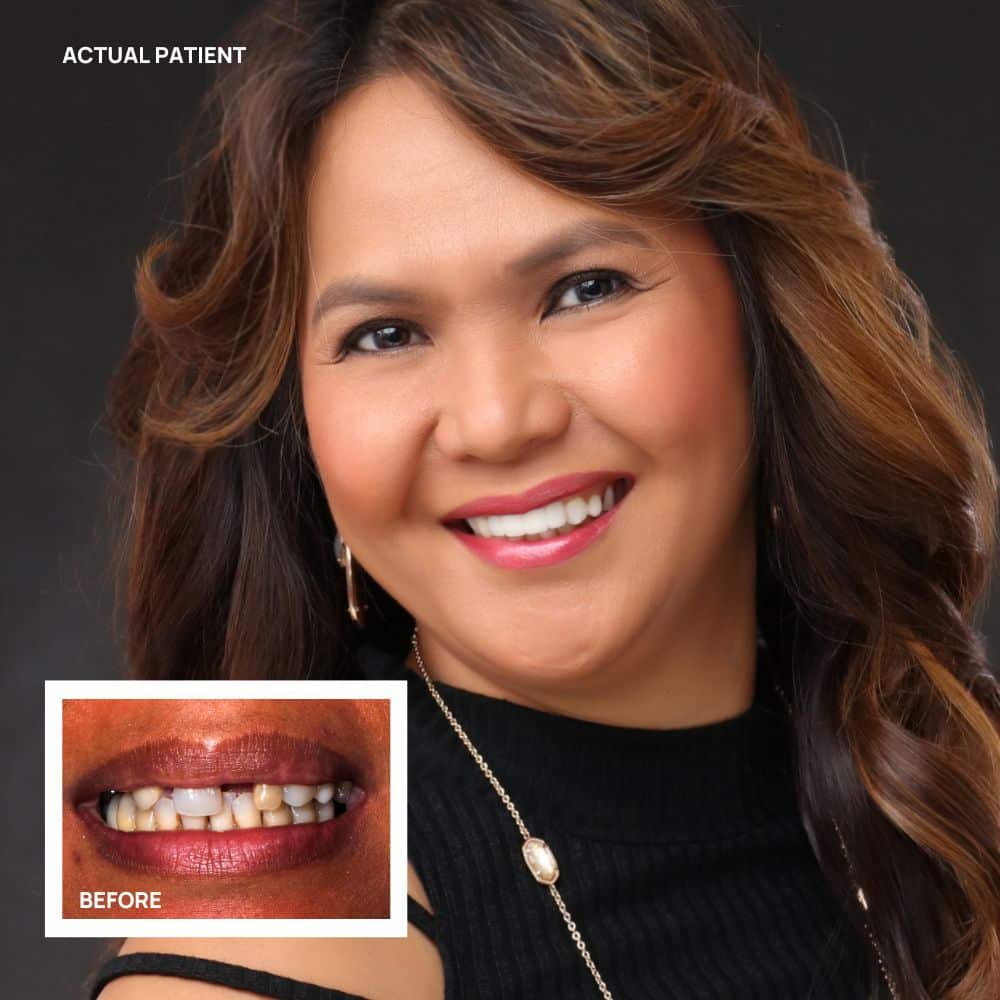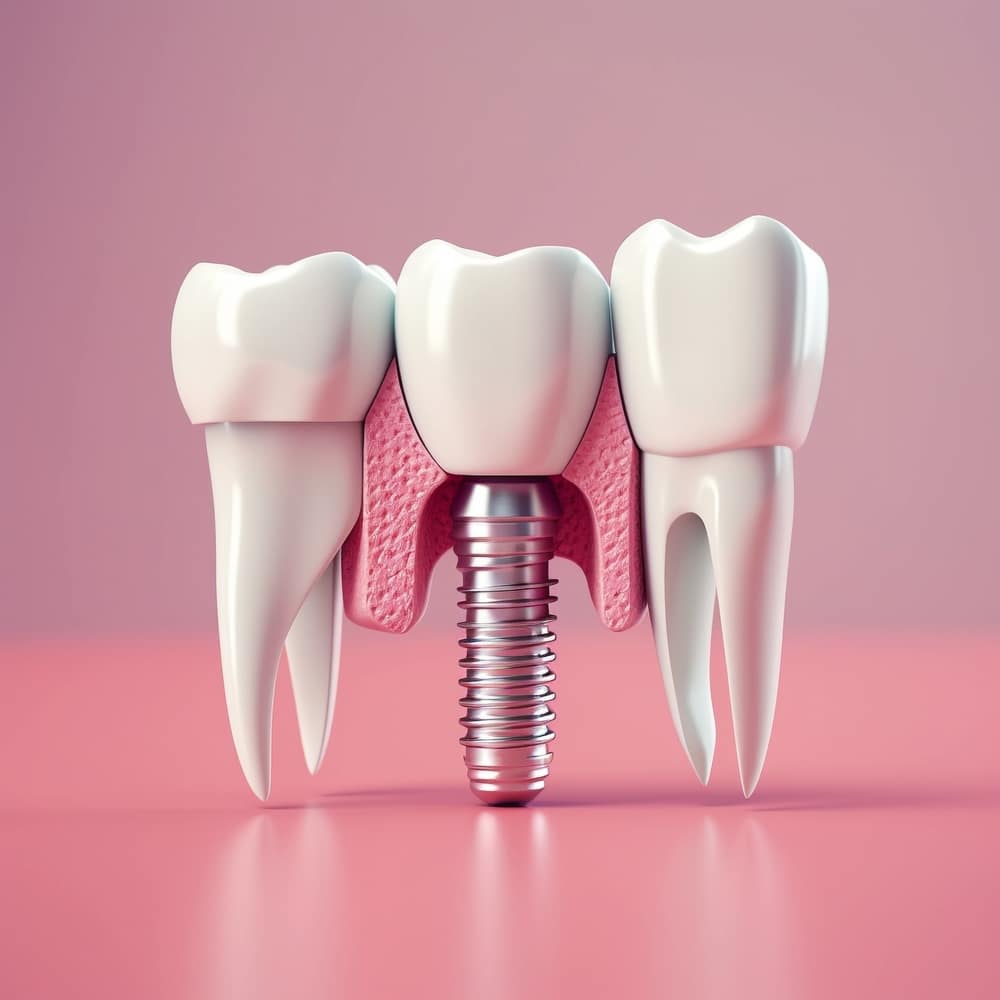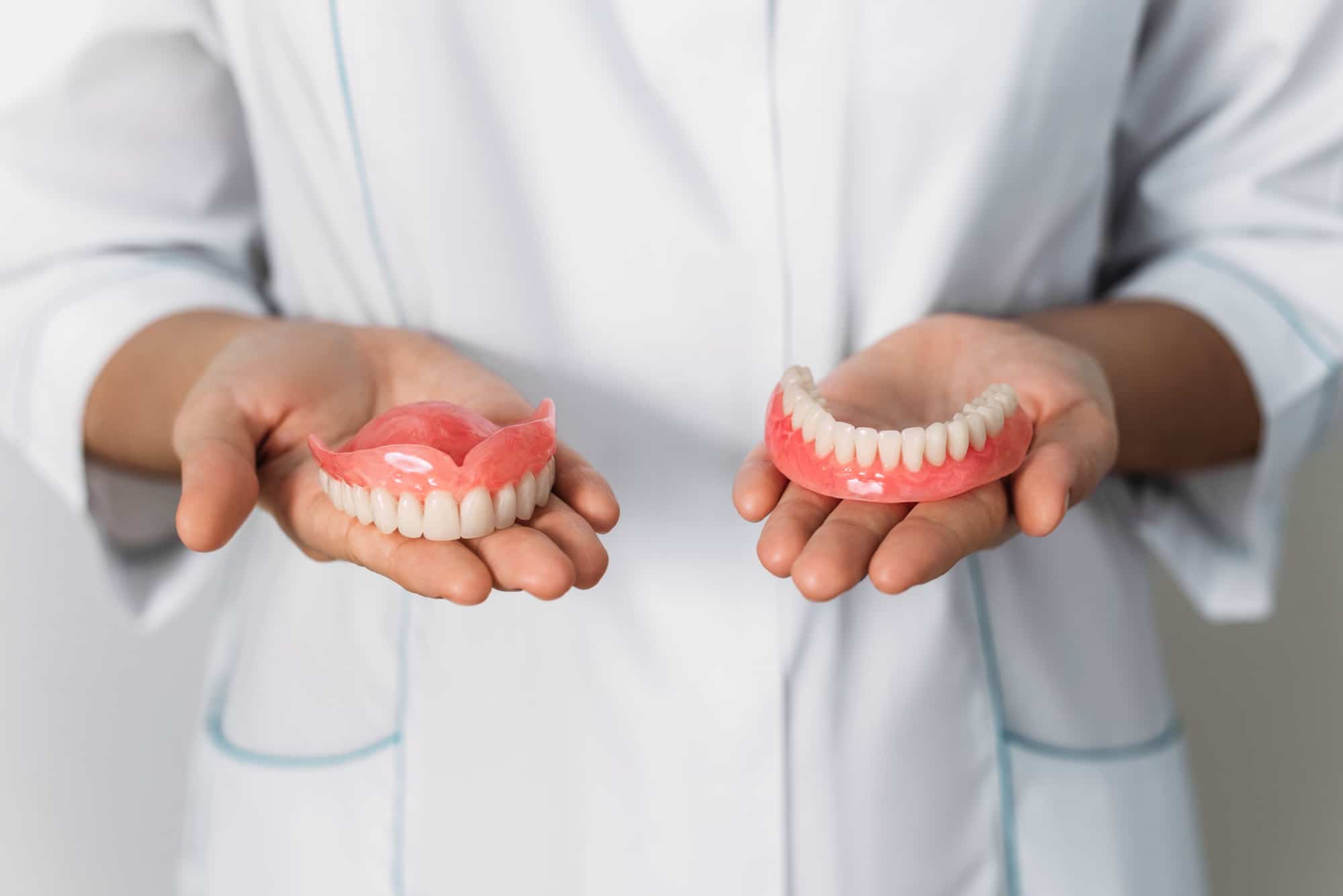Dentures in Plano, TX
Restore Your Smile, Confidence, and Quality of Life
If you’re missing teeth, you’re not alone—and you don’t have to live with discomfort or embarrassment. At Stonebriar Smile Design in Plano, we offer custom-crafted dentures made from durable, lifelike materials designed to help you speak, eat, and smile with ease. Whether you’re missing several teeth or an entire arch, our team is here to help you regain confidence and enjoy a more complete, functional smile.

Why Replacing Missing Teeth Matters
Tooth loss affects more than just your appearance. Gaps in your smile can lead to:
The Effects of Missing Teeth
Missing teeth can lead to more than just cosmetic concerns—they can seriously impact your oral health and quality of life. Whether caused by decay, gum disease, or injury, tooth loss can make everyday activities like speaking and eating more difficult. Over time, untreated gaps can also lead to jawbone deterioration, which may alter your facial structure and contribute to a prematurely aged appearance. Replacing missing teeth with dentures is an important step in protecting your health and preserving your confidence.


Who’s a Good Candidate for Dentures?
If you’re missing multiple teeth and want a cost-effective, time-tested solution, dentures may be right for you. Our team will assess your oral health and discuss your lifestyle and goals to determine if dentures are the best option. If not, we’ll walk you through alternative treatments and help you choose the path that fits your needs.
What are Dentures Made Of?
Dentures consist of two main components:
Denture Base – The gum-colored base is crafted to sit comfortably on your soft tissue and is typically made from acrylic or similar materials, depending on the type of denture.
Artificial Teeth – These are made from resin or porcelain and are designed to mimic the look and function of natural teeth.

Types of Dentures We Offer in Plano
At Stonebriar Smile Design, we offer a variety of denture options to address varying levels of tooth loss and to accommodate personal preferences and needs. All of our prosthetics are made from durable, high-quality materials that you can count on to last for many years to come. Depending on your circumstances, we may recommend one of the following:




Partial Dentures
Partial Dentures
Ideal for patients missing several teeth in an arch. These prosthetics are designed to fit around your remaining teeth and fill in the gaps for a complete, natural-looking smile.

Full Dentures
Full Dentures
Used when all teeth in the upper or lower arch are missing. These rest on the gums and stay in place using natural suction and adhesive, restoring function and facial appearance.

Implant Dentures
Implant Dentures
For added stability and longevity, dentures can be secured using dental implants. This modern option reduces shifting and enhances comfort, offering a more permanent and secure solution.
How Are Dentures Made?
Creating a custom denture involves multiple detailed steps:
Step 1: Your dentist takes a digital impression of your upper and lower gums, which is then sent to a dental lab. The lab uses this 3D model to create wax dentures that replicate the shape of your mouth.
Step 2: Once the wax dentures are ready, your dentist places them for a trial fitting. If you’re happy with the look and feel, the restorations are sent back to the lab for final processing.
Step 4: A technician boils the dentures to remove the wax portions, places them in a flask, and pours plaster around them. The flask is then heated in hot water to fully melt away the wax.
Step 5: Holes are made in the artificial teeth to help bond the new material. A liquid separator is applied to the plaster, and acrylic is injected into the flask to form the final denture base.
Step 6: Once the acrylic has set, the plaster is removed, revealing the finished prosthetic. The dentures are then placed in an ultrasonic bath to eliminate any remaining debris.
Step 7: The technician trims excess acrylic, polishes the dentures, and prepares them for delivery.
Step 8: You return to our office for a final fitting, where we make any necessary adjustments to ensure comfort and a natural appearance.
The Benefits of Dentures
Dentures are so effective at replacing missing teeth that they boost your quality of life! You can also count on dentures to be more affordable than other restorations. As such, they’re an excellent option for those on a budget. Here are several benefits of dentures:
Psychological Benefits
Losing teeth can take an emotional toll. It’s common for people to feel self-conscious or less confident after tooth loss, which may lead to withdrawing from social situations or avoiding the camera altogether. Dentures help restore more than your smile—they can restore your sense of self. Replacing missing teeth often brings a noticeable boost in confidence, making it easier to smile, speak, and interact with others comfortably.
Clearer Enunciation
Teeth play an important role in helping you form words clearly. When several are missing, everyday speech can become difficult or even embarrassing. Dentures provide support to your lips and tongue, making it easier to pronounce words and speak with clarity. After a brief adjustment period, many patients find they can communicate more naturally and confidently.
Improves Nutrition
Tooth loss can make it hard to eat a balanced diet—especially when it comes to nutrient-rich foods like fruits, vegetables, and lean proteins. Dentures allow you to chew more effectively, opening the door to a wider range of food choices and improving your overall nutritional intake. With better chewing ability, you can enjoy meals without discomfort and maintain a healthier diet.
Preserves Oral Health
Empty spaces left by missing teeth can lead to more than cosmetic concerns—they can invite bacteria buildup, cause neighboring teeth to shift, and even lead to further tooth loss. Dentures help prevent these issues by filling the gaps and supporting the structure of your mouth. This not only restores your smile but also contributes to long-term oral health.
Improve Connections
Your smile is often one of the first things people notice about you. Having a complete, healthy-looking smile can make a strong, positive impression—both personally and professionally. Dentures help you feel more at ease in conversations, photos, and social situations, allowing you to connect with others without hesitation or self-doubt.
Alternative Tooth-Replacement Options
If you’re not a good denture candidate, there’s no need to worry. Our office in Plano offers several other tooth-replacement options.
Depending on your needs, we can provide the following:
Dental Bridges: Fixed restorations supported by neighboring teeth, ideal for replacing one or a few teeth.
Dental Implants: Permanent restorations placed in the jawbone for unmatched stability and function.
Alternative Tooth-Replacement Options
If you’re not a good denture candidate, there’s no need to worry. Our office in Frisco offers several other tooth-replacement options.
Depending on your needs, we can provide the following:
Dental Bridges: Dental bridges are fixed restorations that replace one or a few teeth. They’re usually made up of two (or more) crowns affixed to healthy, neighboring teeth.
Dental Implants: Dental implants are restorations placed directly in your jawbone. Due to relying on titanium bases, they naturally fuse with your jaw over time. They’re permanent and comfortable but are more expensive than traditional dentures.
Adjusting to Your New Dentures
Some initial soreness or difficulty speaking and eating is normal. Most patients adapt quickly, and our team is here to help if adjustments are needed.
Understanding the Cost of Dentures
The cost of your dentures will depend on factors like the type of denture, number of teeth being replaced, and materials used. During your consultation, we’ll provide a clear, personalized estimate and review payment and financing options.
Dentures Aftercare
Even with full dentures, regular dental visits remain important. We monitor your gum health, check for any signs of concern, and ensure your dentures continue to fit comfortably.
Removable Dentures Aftercare
All-on-4 Dentures Aftercare
Do you have all-on-4 dentures? Here are the advised guidelines to effectively care for your new smile and promote good oral health:
Dentures Frequently Asked Questions
Getting dentures in North Texas does come with some questions. Thankfully, our dedicated and personable team is here to help you understand the process from start to finish. To make sure you’re receiving the restorative treatment that’s right for your unique smile, we’ve taken the time to address some common concerns by answering a few of the questions that we get asked here at Stonebriar Smile Design. If you don’t see the information you’re looking for, don’t hesitate to give us a call and we’ll be happy to help!
HOW CAN I ADJUST TO WEARING DENTURES?

When you’re first fitted with your dentures, it can take some time, usually a few weeks, before your mouth grows fully accustomed to the new appliance inside it. As uncomfortably as it may be at first, you must continue to wear them throughout the day to help your mouth get used to them. Here are some tips to help speed up the adjustment process:
- Cut your food into small pieces and chew evenly with both sides of your mouth.
- Apply a small amount of denture adhesive to help them stay in place.
- Exercise your cheeks to give you more control over your dentures.
- Practice reading your favorite book out loud.
HOW MUCH DENTURE ADHESIVE SHOULD I USE?

Before you apply any adhesive, it’s important that your dentures are clean and dry. To ensure even coverage, start by placing a series of small dots or strips of adhesive on the dentures. Make sure to avoid applying it too close to the edges, as that can make it more difficult to remove your dentures come bedtime. For a secure fit, press and hold your dentures firmly in place for a few seconds.
HOW DO I KNOW WHEN MY DENTURES NEED TO BE ADJUSTED?

Costs for preventive services like checkups and cleanings will largely vary depending on a few key factors. For example, the geographical location (i.e. cities vs. rural areas) as well as your current oral health can influence the final price. During a checkup, our dentists go over patient health history and discuss any concerns they may have. Then, we’ll perform an exam, cleaning, X-ray, and oral cancer screening. On average, dental checkups fall between $200 and $350. While we are happy to help you use dental insurance, we will always provide recommendations based on what is best for your health.
HOW DO I KEEP MY DENTURES CLEAN?

- Brush your dentures at least once daily with a special denture brush and denture cleaning solution.
- After removing your dentures, always clean your gums and tongue, whether it’s with a toothbrush, mouthwash, or even rinsing with water.
- Remove and rinse off your dentures after every meal or snack.
- Always handle your dentures with care so that you don’t accidentally drop them.
- Soak your dentures in room-temperature water every night.
- Schedule a routine checkup with our team twice a year or once every six months.
